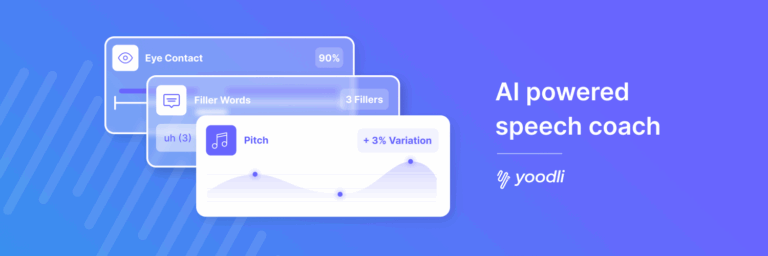The Fear-Less Public Speaking Blog
You will find articles here, mainly about public speaking nerves. These articles feature many of my clients and their stories about dealing with public speaking anxiety.
If you are interested in a course or one-on-one coaching, see what others say for direct testimonials.
Why a ‘Service Mindset’ Will make You a Better Public Speaker – And a Less Nervous One!

Public speaking is a performance, but it is not the same as acting. There are two main differences. The first is fairly obvious – as an actor, you are being someone else, but as a public speaker, ideally, you are being yourself. Many people struggle...

How I Am Using Yoodli — A New AI Tool — To Support My Public Speaking Coaching

Yoodli is an exciting new AI public speaking tool that I am using in my coaching.A lot of my work is with people who have extreme public speaking anxiety that holds them back from achieving their career and life goals. In my experience, there...

Giving a Good Presentation Is One Thing – But Having Impact Is Another

Recently someone approach me for private coaching. She was nervous about an upcoming presentation. Before she ran through her presentation, she told me that her topic was important to her audience and she really wanted to have impact. Then she practiced her presentation by sharing...

Your Fear of Public Speaking is Not the Problem – It is Your Fear of the Fear

“Overcome”, “conquer”, “kill”, “get over”, and “cure the fear of public speaking” are all terms that people google. I know – I have done the keyword research!If you are anxious about public speaking, you probably see your anxiety as a big problem. You worry that...

Why Reading Your Speech is Like Riding a Bike with Training Wheels

Remember learning to ride a bike? You probably started with training wheels. What happened when your parents removed the training wheels? Perhaps you went, wobble, wobble, wobble, splat. The next time the wobble lasted a little longer before the splat, and then maybe by the...

What Type of Person Fears Public Speaking?

The short answer is most people! But some people have extra high levels of anxiety about public speaking. This article explores how different personality types or attributes can affect people’s anxiety levels. The typical demographic profile for people who take the Fear-less public speaking course...

Experiencing ‘Zoom Panic’? You Are Not Alone.

You have heard of ‘Zoom fatigue’ – the experience of feeling exhausted from being online all day. But have you experienced ‘Zoom panic’? During and post-COVID, I had a spate of calls from people who have had a bad experience presenting online. Some of them...

Why You Are Wrong About What Your Audience Thinks of You – If They Think of You at All!

When I ask clients why they think so many people fear public speaking, I get the same answer almost every time: “Because we’re scared of being judged.” While people will form some impression, you are almost certainly wrong about how much people are judging you...

No Good at Public Speaking? Six Reasons Why Improving Is Just Like Learning to Play a New Sport (Or Any Other Complex Skill)

I recently heard someone describe the three phases he goes through when learning a new skill. The first stage is fear. The second stage is grit – the hard work that goes into getting good at anything. Thirdly, there is mastery – the feeling of...

How to Share Something Personal With an Audience Without Oversharing! Seven Questions That Will Help if You Are Unsure

On the first night of my public speaking course, I tell people the story of my epic public speaking fail. You can read all about it on my Medium site. The short version is that I had a panic attack in front of the senior...

Have You Had an Epic Public Speaking Fail? Here Is How to Stop Beating Yourself Up

Many of my clients come to me after an epic and humiliating public speaking fail – or a series of more minor fails.I spend the first half of the course explaining the reasons why we are hypercritical of ourselves and why they have probably overestimated...

Do You Have Employees Hiding a Fear of Public Speaking?

This email arrived in my inbox today, “Hi, I am terrified about public speaking and the panic attacks that come with it! I go to great lengths to avoid these situations, and it’s having an impact on my life. Is this the sort of course...

Nervous About Public Speaking? Self-Talk That Actually Helps

You’ve got an important presentation coming up. Your stomach’s in knots, your heart’s pounding, and your mind is already racing ahead to all the ways it could go wrong. You barely slept last night, and the thought of standing in front of a room full...

Five Slightly Unusual Public Speaking Tips to Improve Your Delivery and Reduce Nervousness!

There are plenty of useful articles about public speaking, but many of them repackage similar tips. Remember to pause; practice your presentation thoroughly; maintain eye contact; focus on your audience; tell stories; and so on. Don’t get me wrong — it is all great advice! But I...

